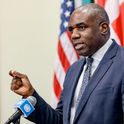Since 7th October, Israelis and Palestinians have seen brutality and injustice eclipsing the already bleak precedents of recent decades. The past eight months have been marked by an unfathomable loss of life, dehumanising violence, hundreds of hostages, millions of displaced persons, and the greatest humanitarian crisis this conflict has known. The notion that the Israeli-Palestinian war could be managed or that the status quo was sustainable—an idea that far too many of the G7 leaders meeting in Italy this week have subscribed to—has been exposed as a deadly fallacy.
Last week, G7 leaders endorsed Joe Biden’s comprehensive ceasefire and hostage deal, which would ensure both “Israel’s security interests and Gazan civilian safety”. That is an important and necessary step to ending this horrific war, and should be welcomed by all. But at this summit, which starts on 13th June, we will find out whether their agenda extends beyond calming this immediate crisis. If the underlying issues that brought us to this moment are left unresolved, the horrors will only repeat themselves.
How will we know how serious the leaders of the G7 are in this mission? One of the most meaningful metrics will be whether they finally, and for the first time, centre the work of civil society peacebuilders, who reject the idea that the conflict can be “managed”, on the path to a solution. They are essential, prerequisite partners in any diplomatic effort that is sincerely aimed at ending the decades-long war.
Each year, the leaders of the G7 nations—Canada, France, Germany, Italy, Japan, the UK and the US; the EU participates, too—gather in a picturesque location to discuss the most urgent issues of the day. Their considered collective view is then codified in the “Leaders’ Communique”, a lengthy and intensively negotiated document that distills the priorities of the world’s most powerful and affluent democracies. The Israeli-Palestinian conflict has long been one of the most important issues demanding the attention of these states. Between 2000 and 2019, it featured in all but one G7/G8 communique, often at very great length. In the five years leading up to the Gaza war, however, it was mentioned in only one.
The result of this neglect and deprioritisation is the most devastating and grisly round of violence between Jews and Palestinians in more than a century: almost 40,000 dead Palestinians in Gaza, where the majority of the population are children; the largest pogrom mounted on Jews since the Holocaust; rape and sexual violence used as a weapon of war; the largest displacement of Palestinians—more than four out of five Gazans—since the Nakba. And no end to the war in sight.
It is not just the scale of the trauma, but its nature that deserves careful thought from any diplomat serious about ending the conflict for good. Since 7th October, the very worst moments in both Jewish and Palestinian history have been repeated, reviving intergenerational trauma. This has created fertile ground for extremists, who are not in short supply in either Israeli or Palestinian politics, to leverage collective pain in the service of zero-sum, violent agendas. Perhaps the depth of the tragedy and the extent of the violence will enable a critical mass of Israelis and Palestinians, staring deeply into the abyss, to be persuaded that another path is urgently required.
Given this context, a copied-and-pasted paragraph in the G7 communique restating long-established positions on the need for a two-state solution will not suffice. Any collective G7 strategy to address the spiralling crisis and put both peoples on course to freedom, security and self-determination needs new ideas. And it must engage with the deep trauma, fear and dehumanisation felt by Palestinians and Israelis, before and since 7th October. At its core, this strategy must include the work of civil society peacebuilders. They are the highly networked, effective and utterly dedicated on-the-ground vanguard for peace and equality.
As the former UK Middle East minister Alistair Burt recently argued, supporting the G7’s integration of peacebuilding work into its Israel-Palestine strategy is critical if we are to have any hope. “This time, a bottom-up process must accompany the top-down for there to be lasting peace, justice and security… With the limitations of the existing political leaderships so apparent, it is not unreasonable to demand that civil society efforts be fed into the horizon of a revived peace process. Amid failure, their efforts have been a success,” he wrote in Arab News.
After decades of international deprioritisation, civil society is demanding a seat at the table. Some 160 peacebuilding NGOs in Israel and Palestine have written a letter addressed to G7 leaders. Their call has been co-signed by 200 NGOs from around the world, including from every G7 member state, as well as places like Northern Ireland, South Africa and Colombia, which know only too well the pain of entrenched conflict and the vital role that civil society plays in resolving it. Thirty-seven British parliamentarians have now written to Prime Minister Rishi Sunak and Foreign Secretary David Cameron amplifying this call. Some 22 members of the European Parliament have made a similar argument to the presidents of the European Commission and Council.
This message has now been co-signed by Pope Francis, who was presented with it by Maoz Inon and Aziz Abu Sarah, an Israeli and a Palestinian who have each lost family members to this horrific conflict, and have now dedicated their lives to ending it. Indeed, the proof of concept for how this trauma can catalyse profound activism for change can be found in people like Maoz, his brother Magen, and Aziz. Or Ahmed Fouad Alkhatib, who has lost more than 30 members of his family in Gaza. Or Yonatan Zeigen, whose mother Vivian Silver was killed on 7th October. Or Kamal Al-Mashharawi, whose family home was destroyed in an Israeli airstrike. Or in the work of the Bereaved Families Forum, a group of Israelis and Palestinians who have lost family members to this conflict and have worked tirelessly for years to end it. Alongside their partners Combatants for Peace, an organisation made up of former practitioners of violence who have since renounced it, they mounted the Joint Memorial last month. Around 20,000 people joined to watch online and grieve together.
They are all, alongside the 160 Israeli and Palestinian NGOs and over 200 NGOs from around the world, asking the G7 to “affirm their commitment to working together multilaterally—and with other international partners—to closely coordinate and institutionalise support for civil society peacebuilding efforts. Ensuring that such efforts are part of a larger strategy to build the foundations necessary for a negotiated and lasting Israeli-Palestinian peace.”
This week, G7 leaders have the chance to correct their collective error, re-prioritise the resolution of this conflict, and establish a legacy for this 50th G7 summit by finally centring the work, as Aziz Abu Sarah recently said in conversation with Maoz Inon, of Israelis and Palestinians who believe in justice, peace and equality—and empowering them to work within their societies to convince those who don’t… yet.












